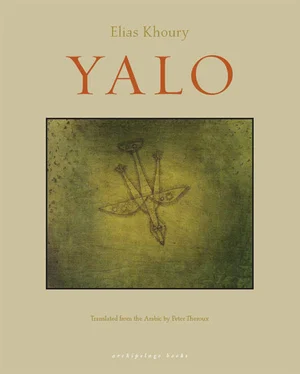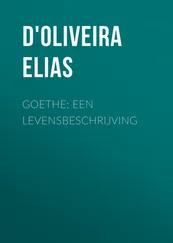“What about your father? I’m asking you about an uncle on your father’s side.”
“I don’t know, I swear I don’t know. He might have brothers or sisters, but I don’t know them. I don’t know my father. I’ve never even seen his picture, I asked to see one once, but my grandfather didn’t want me to talk about that.”
Why did the interrogator not believe Yalo, who stood before him with his long eyelashes, his hands shaking, his back bent, his stammering, and the words that hardly made it out of his mouth?
Yalo had known that no one would believe him. That’s why he said whatever he wanted, because in the war no one believed anyone. But now the war was over, as he told Shirin. He told her he hated the war because of all its lies, and that when he met her he was sure the war was over because he had stopped lying; he wanted to start his life all over again, he loved her.
No, before the war ended, Yalo decided to emigrate. It was his friend Tony Atiq’s idea. Yalo did not know whether Atiq was Tony’s actual family name, or a nickname he had acquired, as people tended to acquire nicknames in the war which took the place of their real names.
Tony said he was atiq — old.
“I’m an atiq Syriac,” he said, and told so many stories about his heroic deeds that Yalo did not believe. “How can I believe what you say when your eyes are lying?” But the words were eyes. He tried to explain to his friend that words were like eyes, but Tony was blind when it came to words. He said whatever he pleased, and bragged all the time. No one believed him, but he did not care, he kept talking, because talk leads to more talk.
“Words are eyes,” the cohno told his grandson as he opened a book, in order to teach him the basics of reading the Syriac alphabet.
“Look closely at the words, my boy. Do you know why mankind is so absorbed with reading? You understand, it is the words, they watch us, because they can see and breathe.”
But the war taught Yalo to believe his own eyes, not the eyes of words, and he would make his peace with words only in prison, where the interrogator would force him to write his whole life story, from beginning to end, several times over. That was when he would discover that his grandfather was right, that when speech was written down, it looked up at the writer and carried on a discussion with him, forcing him to write what needed to be written.
In the war, however, words flowed just as blood flowed. Blood flowed and speech flowed, and people no longer believed a thing, neither blood nor words.
Yalo believed Tony Atiq only once, when he convinced him to rob the safe of the Georges Aramouni Barracks so that they could flee with the money to France, where they would start a new life.
Yalo broke into the safe and robbed it, and Tony got hold of tickets for the boat to Larnaca in Cyprus, and from there, plane tickets to Paris.
In the luxury hotel in Paris, Tony disappeared with the money, leaving Yalo alone, with nowhere to go except the Métro tunnel at Montparnasse, where he found some warmth in the bitter cold of Paris. Yalo found himself in a strange land without even the means to buy a dry crust of bread. He sat in the Métro and begged. There Monsieur Michel Salloum found him and took him back to Lebanon, and from that point the story was known, because it all alternated between the interrogation room and his jail cell.
Yalo said that he had lied to her so that she would be impressed and fall in love with him.
He said it was love.
He said that Shirin let him languish for a whole year waiting for her. A year during which all he saw were promises in her small eyes. A year during which he called every day and waited under the window of her house or in front of the Araissi Advertising Company building, where she worked. A year during which he haunted the Beirut night searching for her and her middle-aged lover, and later on for the young man with the thin mustache she said was her fiancé.
Yalo wrote that he was surprised when he saw the young man sitting beside Shirin in the interrogation room, squinting through his thick, black-framed eyeglasses as if he couldn’t see. A short, full-bodied young man, fair-skinned and pink-cheeked, with plump thighs, sitting quietly in the interrogation room, Shirin at his side, proud of her fiancé and gazing gloatingly at Yalo, who nearly fell over when he saw her. He steadied himself on the chair before sitting on it.
“Stand up, you dog. Who told you to sit down?” shouted the interrogator.
Yalo stood up, trembling, his eyes closed, before the interrogator allowed him to sit. Then the barrage of questions came at him.
Yalo wrote that when he gathered himself on the chair, opened his eyes, and saw the young man, he ached for his flashlight. This guy would never be able to resist a single point of light; he would collapse and crawl on the ground and say, “Take her, sir, and just let me go.”
But the fiancé sat under the sun falling from the window behind the interrogator’s head, lifted up his little nose as if he were apart from this story and from this whole country.
Yalo would write that when he saw Shirin sitting beside her fiancé, he suffered the third shock of his life.
The first shock was his mother with the mirror that swallowed her face and made her disappear, or at least made her feel that she’d died before her death.
His second shock was Tony Atiq, who vanished in Paris, taking the money with him, along with the French he knew, leaving Yalo alone with no money and no language.
Shirin was the third shock.
When they arrested him in his little house, the thought of Shirin never occurred to him. He assumed that the Madame had betrayed him. He had begun to notice for some time the hatred in Madame Randa’s eyes. Even when he slept with her, he felt that she was no longer sleeping with him, but sleeping through him.
He said to himself, as he raised his hands in the face of the rifles pointed at him, that this was Madame’s doing, and he laughed to himself. He would expose her and tell everything about his relationship with her. He would enjoy the way Monsieur Michel Salloum’s face would wince as he heard the truth.
“My husband never suspects me, ever. I don’t know what would happen if he ever found out about you. My husband’s crazy about me. He could never imagine you bewitched me.”
Yalo decided not to answer the questions in his house. He put his hands in the air and let them search the house. They confiscated the machine gun, the pistol, a box of ammunition, his overcoat, and the flashlight, while he waited quietly. There at the police station he would expose everything; instead of telling them about his exploits in the lovers’ forest, he would tell them about the Madame.
Then he saw her in front of him, just as he had seen her for the first time.
He came with M. Michel to the villa in Ballouna. Yalo went to his house, showered, put on clean clothes, and went up to the villa. There he saw the most beautiful woman he had ever seen in his life. Randa was tall and dark with short black hair. Her lips were thick and full and her eyes green. He walked in and saw her embracing her husband with her bare arms. When she noticed Yalo, she took a step back. Yalo sensed that this woman’s gaze fell on him from above. He detected a fugitive smile meant for him alone; embarrassed, he felt that his feet could no longer support him, so he closed his eyes and fell into the chair. Then he got up, wishing to leave.
“Just a moment, just a moment,” said Madame.
Yalo stood in front of the door, confused, when Monsieur Michel motioned for him to sit. He sat on the soft red sofa and noticed that Madame had disappeared; then Monsieur also disappeared. Yalo was left alone in a spacious salon hung with various Byzantine icons.
Читать дальше












